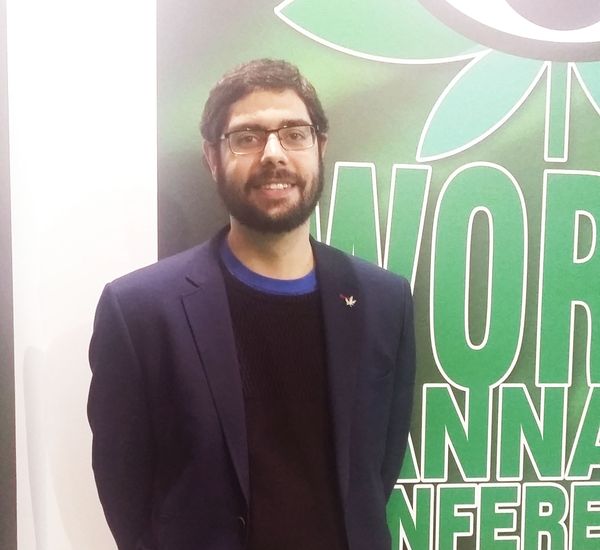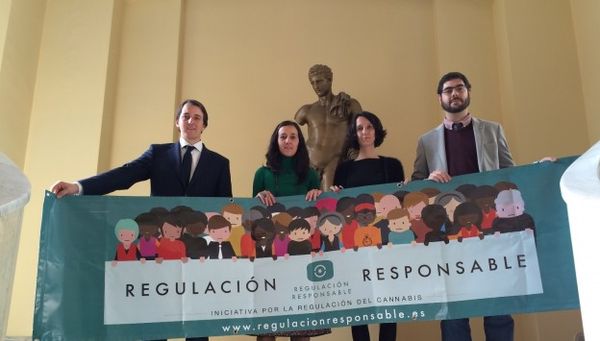- Ramón Morcillo, spokesman of Regulación Responsable (Responsible Regulation), is convinced that by 2017, due to the current political situation and the greater information available to the public, Spain will have one of the most advanced regulations in the world, which will not only favour the home growing but indeed the sale and distribution of cannabis products for medical and recreational use, lying outside the black market.

Movements that defend a regulation that is both more rational and more in keeping with the reality of cannabis use at a global level are becoming increasingly more influential and this is particularly true in Spain. Moreover, the growing number of scientific studies that show the potential benefits to health of certain cannabinoids along with the gradual normalisation of a responsible recreational use of cannabis are contributing to throw an objective, tangible reality into relief.
Almost 10% of Spain’s population are cannabis users and there is an increasing number of social agents who not only believe that this use should be decriminalised but that the users themselves should have access to standardised quality products, lying outside the black market. In order to give a voice to this element in society and bring about a de iure normalization of the situation, the “Regulación Responsable” initiative was created a little over a year ago, bringing together private individuals and social organisations that support proposals for a regulation of cannabis production and use in Spain.
“Although we started working on the project at the Expogrow of 2014, this initiative did not become official until the meeting of January 2015. Thanks to the intensive work carried out in these nearly 15 months of existence, we’re succeeding in promoting an awareness of the problems involved in cannabis, a substance used by 10% of the population, which happens to be a similar percentage to that of the LGTB community. These people, following years of mobilization and activism, have managed to gain recognition for their rights and we hope the same happens with cannabis users,” explains Ramón Morcillo, spokesman of the group and a member of its leading triad, alongside Bernardo Soriano, coordinator of the legal committee, and Iker Val, coordinator of the technical committee.
“It’s the non-regulation of cannabis that constitutes an experiment and not the other way round. There’s always been regulation and it’s worked well, while prohibition has generated marginality and squandered resources on persecuting the use of substances,” says Morcillo. Regulación Responsable is clear in its objectives as well as in the way of achieving them: by trying to influence the social sphere with a serious, objective debate on the one hand, and by directly influencing the political classes and public institutions on the other hand. Part of the group’s strategy lies in a more open approach to the world of cannabis, which eschews any excluding aesthetics or limiting rhetoric.
Cannabis users are to be found in all social, professional and political realms and the objective of Regulación Responsable is that of defending their rights and integrating the various approaches and needs of the millions of users in Spain. “The cannabis movement has long been a closed, self-absorbed world, which means we were unable to convey our demands to other sectors of society. We have now changed this way of functioning and favour a more open attitude, collaborating with other associations and social movements. We’ve finally managed to open the cannabis movement to other sectors and are now less given to navel-gazing”, adds Morcillo.

Influencing the political sphere
At the last Spannabis 2016 session, Bernardo Soriano, the legal representative of Regulación Responsible announced that “the legal battle is over. We must now play the political card and talk to those people who can change the law, namely the politicians, because if things remain as they are now, there’s nothing to be done.” These words have been put into practice. The representatives of Regulación Responsable have already met with such institutions as the National Drug Plan,the Spanish UNO Standing Committee in Vienna, the Spanish medicines Agency, the health services of various communities and several autonomous parliaments, as well as a number of committees of the parties themselves. “The response, on the whole, has been a positive one. The PP sees no sense in regulating and won’t even sit down and talk about it, while the PSOE is contradictory in its attitude, with autonomous and local support but no clear stance at a state level. However, the other parties and such newly established groups as Ciudadanos or Podemos are quite willing to pave the way for us. In fact, some parties, such as IU, have even directly included our regularisation proposal in their programme."
Economic consequences
The activities of Regulación Responsable are primarily informed by the “pressing” need to provide the community of cannabis users with legal security, but its members are also aware of the economic consequences of decriminalising and regulating cannabis. “It’s not just a matter of defending the rights of users but also of putting an end to the wasteful expenditure of thousands of Euros on persecuting these users. The Supreme Court has already stipulated that home growing for personal use is legal, lawful, but a complaint from a neighbour could lead to a court case in which the defendant will probably be absolved, and this entails a squandering of public resources. I insist that one must not only take into account the money that could go into the public treasury with the taxation on cannabis use but also that which could be saved if the fight against cannabis, which makes no sense, either scientifically or morally, came to an end” states Morcillo.
The representatives of Regulación Responsable are ambitious and want to avoid ambiguous regulations or half measures that fail to go to the root of the problem. What they aim for is a comprehensive solution that will not only allow home growing but also contemplate a cannabis industry including the production, distribution and marketing of quality cannabis products for those consumers, whether medical or recreational, who have hitherto been compelled to turn to the black market. “We’ve got to learn from the mistakes made in Holland throughout its almost 40 years of regulation. We simply cannot allow an uncontrolled, unregulated substance to become legal via a Coffee Shop. We actually want to offer a solution to this back door of the Dutch market, with a licensing system that would permit the growing, manufacturing and retail distribution of cannabis. There’s never been a regulation covering as many aspects anywhere in the world”, claims Morcillo.
The current political situation, with both of the emerging parties, Podemos and Ciudadanos, open to cannabis regulation, and the gradual erosion of myths on cannabis resulting from the appearance of published scientific studies and from the increased availability to the public of objective, accurate information on the matter; both of these factors have strengthened Morcillo’s optimism regarding the time frame involved. “When we presented the platform last year, I said that I believed the regulation would arrive in 2017 because we have the right mechanisms to bring this about,” he concludes.



Comments from our readers
There are no comments yet. Would you like to be the first?
Leave a comment!Did you like this post?
Your opinion about our seeds is very important to us and can help other users a lot (your email address won't be made public).